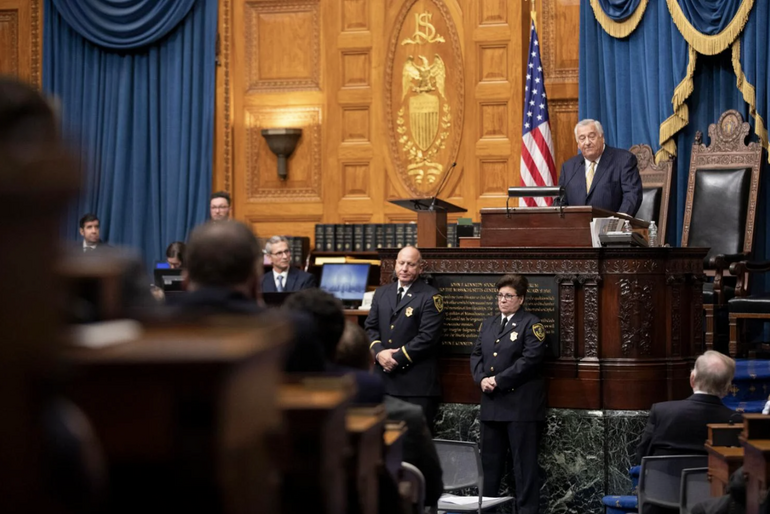The House wrapped up work on a nearly $61.5 billion fiscal year 2026 budget plan after two and a half days of proceedings that added tens of millions of dollars in spending and spotlighted fault lines on a series of broader policy issues.
Representatives took the final 151-6 vote on the budget plan just after 5 p.m. Wednesday, capping off another year in which most of the 1,650 amendments filed were dispatched with a handful of mega-amendment bundles crafted behind closed doors.
Republican Reps. Nicholas Boldyga of Southwick, John Gaskey of Carver, Marc Lombardo of Billerica, Alyson Sullivan-Almeida of Abington, Kenneth Sweezey of Pembroke and Justin Thurber of Somerset voted against the bill. Democrat Rep. Christopher Flanagan of Dennis, who is facing federal fraud charges, was the only representative who did not cast a vote.
The seven so-called consolidated amendments together tacked on about $81 million in spending, mostly in local earmarks, to what began as a roughly $61.4 billion budget. The updated bottom line still stands roughly half a billion dollars below the version Gov. Maura Healey filed in January, before a series of Trump administration developments raised fears about potentially disruptive federal spending cuts.
As the final votes were tallied, House Speaker Ron Mariano praised staff on the House Ways and Means Committee “for a great job under very difficult circumstances, living with the stresses and strains coming out of Washington daily and not knowing what number you were trying to balance to.”
The multi-day proceedings — which in typical fashion featured long stretches of inactivity in the House Chamber while representatives made key decisions in private — ended with one last speech from Chelsea Rep. Judith Garcia, who praised a $5 million line item designed to provide legal aid to immigrants and refugees.
Garcia recounted her mother’s decades of work on an assembly line making hot dogs — “your famous Fenway Franks,” as she put it — with long hours and no complaints.
“Today, many workers still carry that same spirit, but they also live with the daily anxiety that each walk to and from work could bring not just a paycheck but a setback,” Garcia said. “This is the complexity of our immigration system. It’s not black, it’s not white, it’s deeply nuanced and too often unforgiving. And while the challenges are vast, one thing is clear: access to legal representation should not be determined by your paycheck or your profession.”
The state Republican Party criticized that funding proposal, and circulated a quote from Lombardo calling it “unconscionable.”
“Beacon Hill Democrats have gone so far left that they simply don’t represent the hardworking taxpayers anymore. This line item makes this budget vote an easy ‘No,'” Lombardo said in a statement provided by the party.
Over the course of the two and a half days of budget sessions, the House dipped into miniature debates about civil immigration detainers, emergency shelter eligibility, no-cost calls for incarcerated individuals, clean energy mandates, the MBTA Communities Act and more.
In virtually every case, Democrats shot down Republican attempts to make major policy tweaks. The only amendments that the House approved were the seven consolidated packages and a further amendment calling for study of school sports instead of new restrictions on transgender athletes.
One measure quietly tucked into Consolidated Amendment “G” would increase salaries of the eight Governor’s Councilors, from $36,025 to $50,000. Many of the elected councilors continue their careers outside Beacon Hill, typically as attorneys, while serving on the panel that vets and confirms judicial nominees.
The final mega-amendment adopted Wednesday would also create a small business ombudsperson to help businessowners navigate a complicated landscape, and convene a commission tasked with studying “the factors that impact the decisions of individuals and businesses to relocate to and from the commonwealth.” That panel’s report would be due by July 1, 2026.
Consolidated amendment “F”, adopted earlier Wednesday, included:
- $1 million for investments to support “entrepreneurial fellowships enabling the translation of research into businesses, products, and jobs in the energy, transportation and buildings sectors,” as directed by the 2050 Clean Energy and Climate Plan;
- $200,000 to the town of Maynard for the continuation of mitigating water resource issues;
- $575,000 for a program of collaborative research by the Division of Marine Fisheries through the Marine Fisheries Institute, in collaboration with the School for Marine Science and Technology at the University of Massachusetts Dartmouth, to apply innovative technology to “assess the biomass of fish in the region managed by the New England Fishery Management Council and hydrodynamic modeling of coastal waters to accurately assess delineation of shellfish growing area classifications and other applications to improve management of marine fisheries resources”;
- $250,000 to the Boston 4 Celebrations Foundation, Inc., for the Boston Pops fireworks spectacular and July 4 Independence Day celebrations along the Charles River;
- $375,000 to the Boston Public Market Association for the operation and programing at the Boston public market;
- $25,000 to the town of Wakefield for a pollinator garden;
- and $10,000 for the town of Andover to repair and reinstall the town’s historic World War I cannon.
- The House will reconvene in a lightly attended informal session Thursday.
The budget now heads over to the Senate, which traditionally unveils and debates its own proposal in May before a team of House-Senate negotiators crafts a final version to send to the governor.
Lawmakers routinely fail to complete the annual spending plan by the July 1 start of the fiscal year, and in recent years have leaned on interim budgets to keep state government operating while they finish their deliberations.
Senators are also on the verge of advancing their rewrite of a surtax spending bill, which carves up $1.3 billion in available revenues for education and transportation, the House approved April 9.

